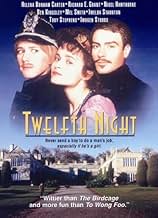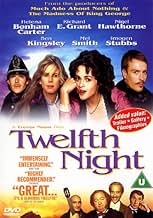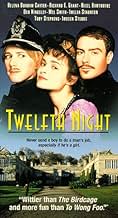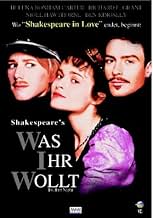CALIFICACIÓN DE IMDb
7.1/10
6.5 k
TU CALIFICACIÓN
Adaptación de la obra de Shakespeare que cuenta la historia de dos hermanos separados tras un naufragio, cada uno creyendo que el otro ha muerto.Adaptación de la obra de Shakespeare que cuenta la historia de dos hermanos separados tras un naufragio, cada uno creyendo que el otro ha muerto.Adaptación de la obra de Shakespeare que cuenta la historia de dos hermanos separados tras un naufragio, cada uno creyendo que el otro ha muerto.
- Premios
- 1 premio ganado y 2 nominaciones en total
Sidney Livingstone
- Captain
- (as Sid Livingstone)
David Burke
- Party Guest
- (sin créditos)
- …
- Dirección
- Guionistas
- Todo el elenco y el equipo
- Producción, taquilla y más en IMDbPro
Argumento
¿Sabías que…?
- TriviaIn the mid 1950s, director Joseph L. Mankiewicz tried to set up a version with Audrey Hepburn and Danny Kaye, but it failed to materialize.
- ErroresFeste's guitar playing for Cesario (Viola) and Orsino does not match up with the soundtrack.
Opinión destacada
A lively, bubbly production of one of Shakespeare's more difficult plays. It's hard to know just what Shakespeare was getting at with this story. The text doesn't always seem to make sense. That's reflected in this, as well as any other, production. At times, one wonders what the expressions on characters' faces are meant to indicate. Just after Feste has fooled Malvolio with his imitation of the curate, for instance, Maria has a perturbed look on her face. As if the joke that she herself so elaborately designed now troubles her. There's nothing in the text to indicate that her expression should show remorse; and yet Sir Toby soon after says that he's sick of the whole thing. Why? That's one example of the difficulty of the text (which may have been corrupted over the centuries), and how it is manifested in this particular production's choices. I don't know why Sir Toby remarks at this point that he's sick of the joke, nor do I know whether Maria should share his feelings.
Another difficulty is the role of Feste. Ben Kingsley fills this role, and because Ben Kingsley is a major star, he magnifies this character (in my opinion) out of all proportion. He becomes a sort of Zen master, pompous and oppressive. His jokes aren't funny (maybe we can't find Shakespeare's jokes funny today, but Kingsley's heavy delivery precludes humor), and his last confrontation with Malvolio comes off as a sort of thundering divine retribution. The entire play, the entire cast, stops dead and Feste takes over as if the whole point of the play has been his apotheosis at the expense of the degraded Malvolio. This surely cannot be what Shakespeare had in mind. Throughout the play he has a disconcerting habit of staring at other characters or the camera with what almost be described as a leer.
Maybe Shakespeare would have sighed and commiserated with the producer of this film, because the clowns in his day were also big stars who demanded a lot of meat in their roles. The trouble is that there just isn't much meat in Feste's role according to the text, so we're stuck with leers and thundering retribution and other inventions. Shakespeare had to accommodate his clowns with ever-more important roles, climaxing with characters like Touchstone and Lear's fool. Kingsley is just inventing his own character. At times his work is interesting, but his weight in the production is, as I said, oppressive.
Still, his screen time is relatively small, and much of the rest of the play is a joy, even if the point of the story isn't always clear. Bonham-Carter was never more alluring, Hawthorne is priceless as Malvolio (he was born for the role), and Smith and Grant are the perfect combination of Belch and Aguecheek. I suppose you might object that all four of them put their eyebrows to such prodigious use that their acting might be characterized as hamming. But I don't see how any of these characters can be played straight if the play is to work.
One thing is for sure, no one would ever accuse this production of bogging down. The pace is lively, the sets and the cinematography are always striking, the score is invigorating, and I suspect that I could watch this film dubbed in Swahili and it would still be a lot of fun. Visually arresting is perhaps the best description.
Another difficulty is the role of Feste. Ben Kingsley fills this role, and because Ben Kingsley is a major star, he magnifies this character (in my opinion) out of all proportion. He becomes a sort of Zen master, pompous and oppressive. His jokes aren't funny (maybe we can't find Shakespeare's jokes funny today, but Kingsley's heavy delivery precludes humor), and his last confrontation with Malvolio comes off as a sort of thundering divine retribution. The entire play, the entire cast, stops dead and Feste takes over as if the whole point of the play has been his apotheosis at the expense of the degraded Malvolio. This surely cannot be what Shakespeare had in mind. Throughout the play he has a disconcerting habit of staring at other characters or the camera with what almost be described as a leer.
Maybe Shakespeare would have sighed and commiserated with the producer of this film, because the clowns in his day were also big stars who demanded a lot of meat in their roles. The trouble is that there just isn't much meat in Feste's role according to the text, so we're stuck with leers and thundering retribution and other inventions. Shakespeare had to accommodate his clowns with ever-more important roles, climaxing with characters like Touchstone and Lear's fool. Kingsley is just inventing his own character. At times his work is interesting, but his weight in the production is, as I said, oppressive.
Still, his screen time is relatively small, and much of the rest of the play is a joy, even if the point of the story isn't always clear. Bonham-Carter was never more alluring, Hawthorne is priceless as Malvolio (he was born for the role), and Smith and Grant are the perfect combination of Belch and Aguecheek. I suppose you might object that all four of them put their eyebrows to such prodigious use that their acting might be characterized as hamming. But I don't see how any of these characters can be played straight if the play is to work.
One thing is for sure, no one would ever accuse this production of bogging down. The pace is lively, the sets and the cinematography are always striking, the score is invigorating, and I suspect that I could watch this film dubbed in Swahili and it would still be a lot of fun. Visually arresting is perhaps the best description.
- d_nuttle
- 22 abr 2007
- Enlace permanente
Selecciones populares
Inicia sesión para calificar y agrega a la lista de videos para obtener recomendaciones personalizadas
- How long is Twelfth Night?Con tecnología de Alexa
Detalles
- Fecha de lanzamiento
- Países de origen
- Sitio oficial
- Idioma
- También se conoce como
- Twelfth Night
- Locaciones de filmación
- Lanhydrock House, Bodmin, Cornwall, Inglaterra, Reino Unido(Olivia's house and garden)
- Productoras
- Ver más créditos de la compañía en IMDbPro
Taquilla
- Presupuesto
- USD 5,000,000 (estimado)
- Total en EE. UU. y Canadá
- USD 588,621
- Fin de semana de estreno en EE. UU. y Canadá
- USD 33,451
- 27 oct 1996
- Total a nivel mundial
- USD 588,621
Contribuir a esta página
Sugiere una edición o agrega el contenido que falta

Principales brechas de datos
By what name was Twelfth Night or What You Will (1996) officially released in India in English?
Responda



































